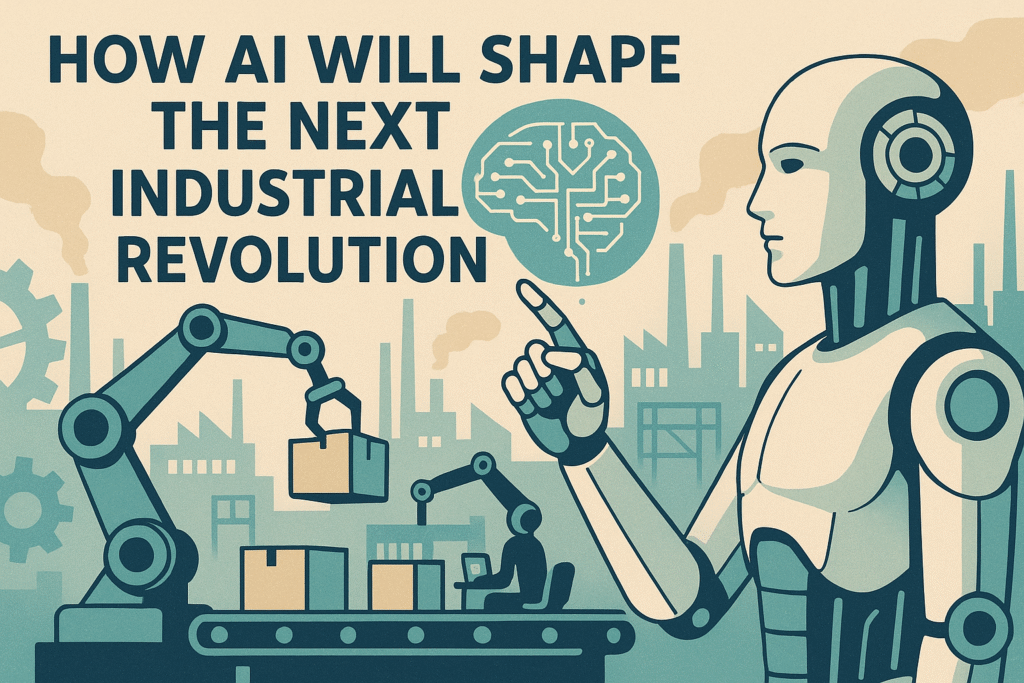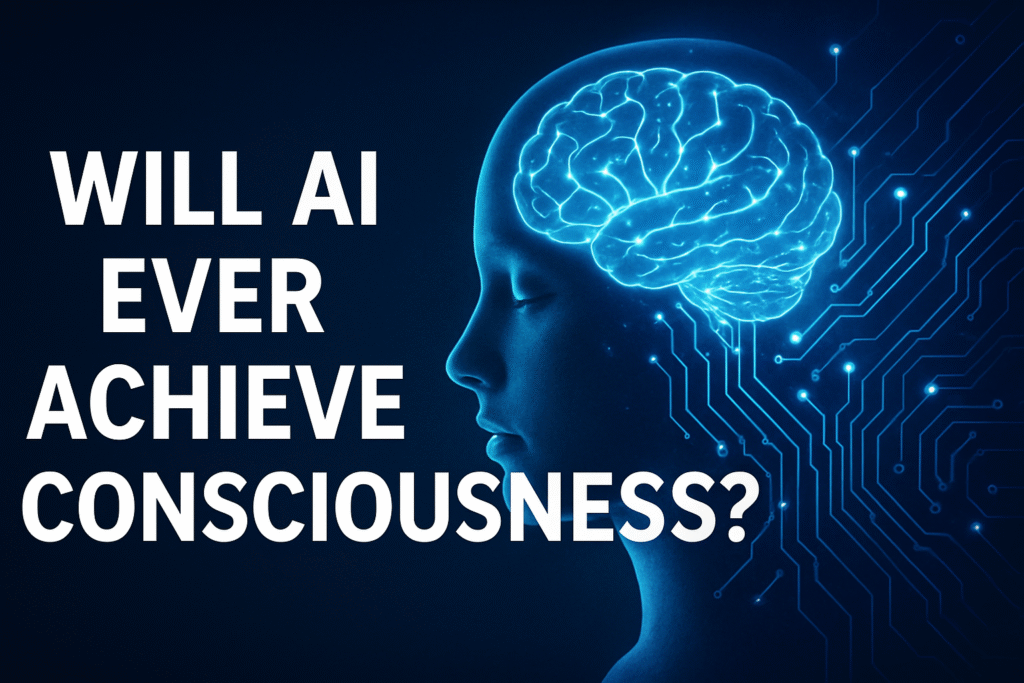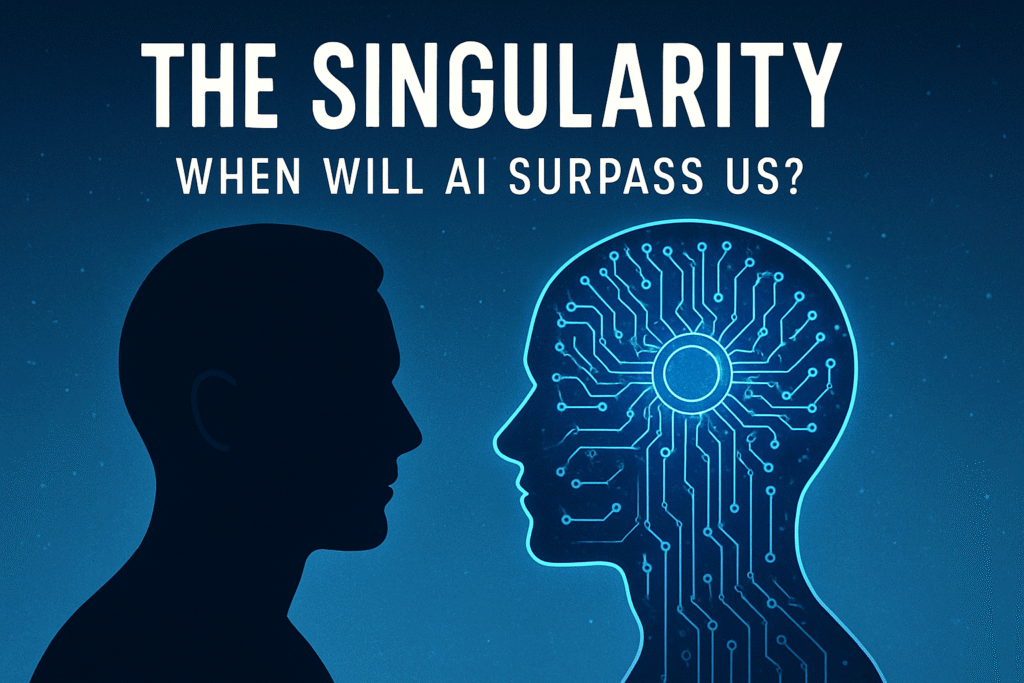🤖 How AI Will Shape the Next Industrial Revolution
We are on the brink of a new industrial revolution, one driven not by steam engines or electricity, but by artificial intelligence (AI). The next industrial revolution promises to be more transformative than any before it, fundamentally changing how industries operate, how products are made, and how humans interact with technology. From automation and robotics to data analytics and machine learning, AI will play a pivotal role in shaping the future of the global economy.
At AiBlogQuest.com, we explore how AI will shape the next industrial revolution, the industries it will impact, and what it means for the future of work.
🧠 What is the Next Industrial Revolution?
The next industrial revolution—often called Industry 4.0—refers to the ongoing transformation of industries through the integration of advanced technologies such as AI, robotics, the Internet of Things (IoT), and big data. This revolution builds upon the previous industrial revolutions, where each one has brought about significant advancements in manufacturing, automation, and production processes.
Industry 4.0 is characterized by the merging of digital, physical, and biological systems, enabling businesses to operate in new, more efficient, and highly interconnected ways. At the heart of this revolution is AI, which powers the technologies that drive these transformations.
🤖 How AI Will Drive the Next Industrial Revolution
1. Automation and Robotics
AI will be the backbone of the next wave of automation. Robots powered by AI can now perform tasks with greater precision and efficiency than humans, leading to increased productivity and lower costs in manufacturing and production.
-
AI in factories: AI-driven robots can work autonomously in factories, assembly lines, and warehouses. They can perform tasks such as welding, assembly, packaging, and even quality control. The use of AI-powered robots helps streamline production processes, reduces the need for human intervention in dangerous environments, and improves operational efficiency.
-
AI in logistics: AI is also revolutionizing logistics with the help of autonomous vehicles and drones, enabling more efficient inventory management, delivery operations, and real-time tracking of goods.
2. Predictive Analytics
AI enables industries to make more data-driven decisions through predictive analytics. By processing vast amounts of data from sensors, machines, and systems, AI can predict future trends, optimize operations, and prevent equipment failures before they occur.
-
Predictive maintenance: In manufacturing, AI can help predict when equipment is likely to fail, allowing businesses to schedule maintenance before costly breakdowns happen. This reduces downtime, improves operational efficiency, and increases profitability.
-
Supply chain optimization: AI can optimize the entire supply chain by forecasting demand, monitoring inventory levels, and improving the efficiency of logistics. It helps companies ensure that products are available when and where they are needed, reducing costs and waste.
3. Intelligent Manufacturing
AI will transform the way products are designed and manufactured, enabling smart factories that can produce goods with greater precision, speed, and customization.
-
3D printing and additive manufacturing are taking product creation to the next level by enabling highly personalized products at a mass production scale. AI algorithms can optimize the 3D printing process, reducing material waste and improving the quality of the final product.
-
AI in design: AI can also assist in the design process by generating optimized product prototypes, automating tasks like design validation, and creating new designs based on consumer preferences or environmental considerations.
4. AI in Data and Analytics
Data is the new oil, and AI-driven data analytics will be crucial in driving innovation across industries. AI can process massive amounts of data, uncover patterns, and generate insights that would be impossible for humans to achieve at such a scale.
-
Business intelligence: AI-powered analytics tools enable businesses to make better decisions by providing real-time insights into operations, consumer behavior, and market trends. With these insights, companies can fine-tune their strategies, improve customer satisfaction, and stay ahead of competitors.
-
Consumer insights: AI can also help companies understand consumer behavior, predict market trends, and develop targeted marketing strategies. This enhances the ability to deliver personalized products and services that meet customer demands.
5. AI-Driven Innovation
As AI continues to evolve, it will be a driving force behind new innovations across a range of sectors:
-
Healthcare: AI will revolutionize healthcare by enabling faster diagnoses, personalized treatment plans, and drug discovery. AI-powered tools like medical imaging and genetic analysis will help doctors make more accurate decisions, leading to better patient outcomes.
-
Energy: In the energy sector, AI will optimize the use of renewable energy resources by predicting energy demand, managing the distribution of power, and improving energy efficiency in homes and industries.
🎯 Benefits of AI in the Next Industrial Revolution
✅ Increased Productivity: AI-driven automation boosts efficiency by eliminating bottlenecks, reducing human error, and accelerating production.
✅ Cost Reduction: AI helps businesses reduce operational costs by optimizing processes, automating tasks, and improving resource allocation.
✅ Innovation: AI fosters innovation by enabling businesses to create more personalized, cutting-edge products and services.
✅ Sustainability: AI can help optimize energy use, reduce waste, and improve supply chain management, making industries more sustainable and environmentally friendly.
⚠️ Challenges of AI in the Next Industrial Revolution
While AI promises many benefits, there are also significant challenges that need to be addressed:
1. Job Displacement
As AI automates tasks traditionally performed by humans, there is concern about job displacement in sectors like manufacturing, logistics, and customer service. Workers may need to reskill or transition to new roles in AI-driven industries.
2. Data Privacy and Security
With the widespread use of AI, the amount of data being collected will increase exponentially. Ensuring the privacy and security of this data is crucial, especially in sectors like healthcare and finance where sensitive information is at stake.
3. Ethical Considerations
AI’s role in decision-making and automation raises ethical concerns regarding accountability, bias, and transparency. As AI systems become more powerful, it’s important to ensure that they are used responsibly and ethically, with proper oversight and regulation.
🌐 The Future of AI in the Industrial Revolution
The next industrial revolution driven by AI holds immense potential for transforming industries, improving efficiency, and enabling new innovations. As AI continues to evolve, its applications will expand, shaping the future of work, manufacturing, and global economic growth. Companies that embrace AI will have a competitive advantage, but they must also address challenges like job displacement, data privacy, and ethical concerns to ensure a positive impact.
The AI-driven future is not just a possibility—it’s already happening. As AI technologies continue to mature, businesses that adopt an AI-first mindset will be well-positioned to thrive in the next industrial revolution.
🔗 Useful Links
🌐 Resources
❓ FAQ – AI will shape the next industrial revolution
Q1: How will AI impact the future of work?
AI will automate many repetitive tasks, freeing up human workers to focus on higher-value activities. However, AI will also lead to job displacement in certain sectors, requiring workers to reskill or transition to new roles.
Q2: What industries will benefit most from AI?
Industries like manufacturing, healthcare, logistics, energy, and retail will benefit greatly from AI by improving efficiency, reducing costs, and enabling innovation. AI will help optimize operations and create more personalized products and services.
Q3: What are the ethical concerns related to AI in industries?
AI’s role in decision-making raises ethical concerns about bias, transparency, and accountability. It’s important for businesses to use AI responsibly, with proper regulations and safeguards in place to ensure fair and ethical outcomes.
🚀 Final Thoughts
The next industrial revolution, driven by AI, will fundamentally reshape industries and society. By embracing AI, businesses can enhance productivity, drive innovation, and create more personalized experiences. However, addressing the challenges of job displacement, privacy, and ethical concerns will be crucial in ensuring that the benefits of AI are widely shared and its risks properly managed.
For more insights on how AI is shaping the future of industry and innovation, visit AiBlogQuest.com, where technology meets creativity.
🏷️ Tags:
AI in Industry, Industrial Revolution, AI Automation, Artificial Intelligence, Industry 4.0, AI in Manufacturing, AI and Business, AI Innovation, AI in Healthcare, AiBlogQuest, AI will shape the next industrial revolution



